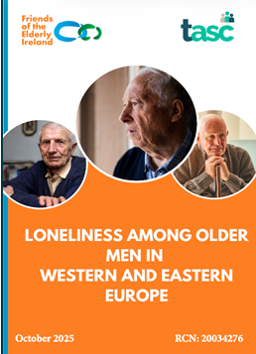
With rising life expectancy and a rapidly ageing population, loneliness and isolation among older adults are set to increase. Today, one in five people in the EU is over 65, and older men make up over 41 million of Europe’s population. But what does this mean for wellbeing and social inclusion?
A new report, Loneliness Among Older Men in Western and Eastern Europe, authored by TASC and commissioned by Friends of the Elderly Ireland, explores these questions across Ireland, Poland, and Romania. Published to mark the 20th anniversary of the EU’s Eastern Enlargement, it provides fresh insights into the causes of loneliness, its impact, and solutions that can make a difference.
KEY FINDINGS
- Social networks are essential. Family, friends, and community groups play a vital role in reducing loneliness. Ireland reports the highest engagement of men over 65 in voluntary activities, while participation in Poland and Romania remains low.
- Mobility and transport barriers. Limited mobility and weak public transport, especially in rural areas, restrict older adults’ ability to socialise and increase the risk of isolation. Ireland benefits somewhat from informal support, but structural challenges remain more entrenched in Poland and Romania.
- Economic challenges persist. Older adults in all three countries rely mainly on State Pensions, but financial stability differs. Irish participants report greater security, while those in Poland and Romania face tighter budgets, higher poverty risks, and patchy healthcare access.
- Digital inclusion is improving but unevenly. While technology helps reduce isolation, many still prefer face-to-face contact. Irish older men show rising digital engagement, aided by family and community programmes. In Poland, digital skills lag among less-educated seniors, and Romania faces the steepest barriers with the EU’s lowest rates of digital literacy.
- Cultural norms shape experiences of ageing. Respect for older men varies: in Ireland, many feel valued by their communities; in Poland, views are mixed and still evolving; in Romania, traditional ideas of strength and self-reliance can discourage open discussion about loneliness.
RECOMMENDATIONS
- Improve perceptions of ageing and mental health through public campaigns and positive media portrayals.
- Raise awareness of available services covering healthcare, rights, financial advice, and cultural activities.
- Strengthen community structures with more inclusive clubs, sheds, volunteering opportunities, and intergenerational programmes.
- Boost digital literacy and connectivity, especially in rural areas, while ensuring non-digital options remain available.
- Enhance mobility by investing in public transport and local mobility supports to reduce rural isolation.
Ensure economic security through fairer pension systems and tailored financial resilience training for older adults.








